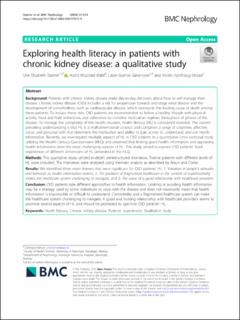| dc.contributor.author | Urstad, Kristin Hjorthaug | |
| dc.contributor.author | Stømer, Une Elisabeth | |
| dc.contributor.author | Wahl, Astrid Klopstad | |
| dc.contributor.author | Gøransson, Lasse Gunnar | |
| dc.date.accessioned | 2020-10-15T08:16:46Z | |
| dc.date.available | 2020-10-15T08:16:46Z | |
| dc.date.created | 2020-09-08T15:41:25Z | |
| dc.date.issued | 2020-07 | |
| dc.identifier.citation | Stømer, U.E., Wahl, A.K., Gøransson, L.G., & Urstad, K.H. (2020) Exploring health literacy in patients with chronic kidney disease: a qualitative study. 21, https://doi.org/10.1186/s12882-020-01973-9 | en_US |
| dc.identifier.uri | https://hdl.handle.net/11250/2682955 | |
| dc.description.abstract | Background
Patients with chronic kidney disease make day-to-day decisions about how to self-manage their disease. Chronic kidney disease (CKD) includes a risk for progression towards end-stage renal disease and the development of comorbidities, such as cardiovascular disease, which represents the leading cause of death among these patients. To reduce these risks, CKD patients are recommended to follow a healthy lifestyle with physical activity, food and fluid restrictions, and adherence to complex medication regimes throughout all phases of the disease. To manage the complexity of this health situation, health literacy (HL) is considered essential. The current prevailing understanding is that HL is a multidimensional concept and comprises a range of cognitive, affective, social, and personal skills that determine the motivation and ability to gain access to, understand, and use health information. Recently, we investigated multiple aspects of HL in CKD patients in a quantitative cross-sectional study utilizing the Health Literacy Questionnaire (HLQ) and observed that finding good health information and appraising health information were the most challenging aspects of HL. This study aimed to explore CKD patients’ lived experiences of different dimensions of HL presented in the HLQ.
Methods
This qualitative study utilized in-depth semistructured interviews. Twelve patients with different levels of HL were included. The interviews were analyzed using thematic analysis as described by Braun and Clarke.
Results
We identified three main themes that were significant for CKD patients’ HL: 1. Variation in people’s attitudes and behavior as health information seekers, 2. The problem of fragmented healthcare in the context of multimorbidity makes the healthcare system challenging to navigate, and 3. The value of a good relationship with healthcare providers.
Conclusion
CKD patients take different approaches to health information. Limiting or avoiding health information may be a strategy used by some individuals to cope with the disease and does not necessarily mean that health information is inaccessible or difficult to understand. Comorbidity and a fragmented healthcare system can make the healthcare system challenging to navigate. A good and trusting relationship with healthcare providers seems to promote several aspects of HL and should be promoted to optimize CKD patients’ HL. | en_US |
| dc.language.iso | eng | en_US |
| dc.publisher | BioMed Central | en_US |
| dc.rights | Navngivelse 4.0 Internasjonal | * |
| dc.rights.uri | http://creativecommons.org/licenses/by/4.0/deed.no | * |
| dc.subject | nyresykdom | en_US |
| dc.subject | health literacy | en_US |
| dc.title | Exploring health literacy in patients with chronic kidney disease: a qualitative study | en_US |
| dc.type | Peer reviewed | en_US |
| dc.type | Journal article | en_US |
| dc.description.version | publishedVersion | en_US |
| dc.rights.holder | © The Author(s). 2020 | en_US |
| dc.subject.nsi | VDP::Medisinske Fag: 700::Klinisk medisinske fag: 750::Nefrologi, urologi: 772 | en_US |
| dc.source.volume | 21 | en_US |
| dc.source.journal | BMC Nephrology | en_US |
| dc.identifier.doi | 10.1186/s12882-020-01973-9 | |
| dc.identifier.cristin | 1828179 | |
| cristin.ispublished | true | |
| cristin.fulltext | original | |
| cristin.qualitycode | 1 | |

